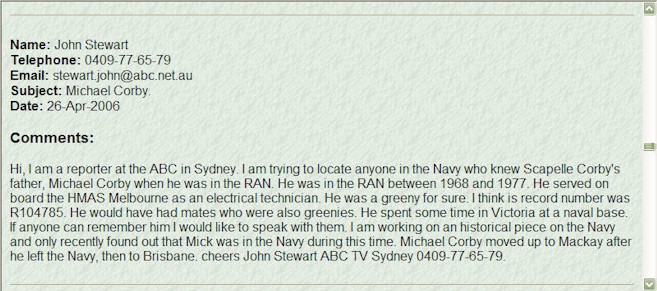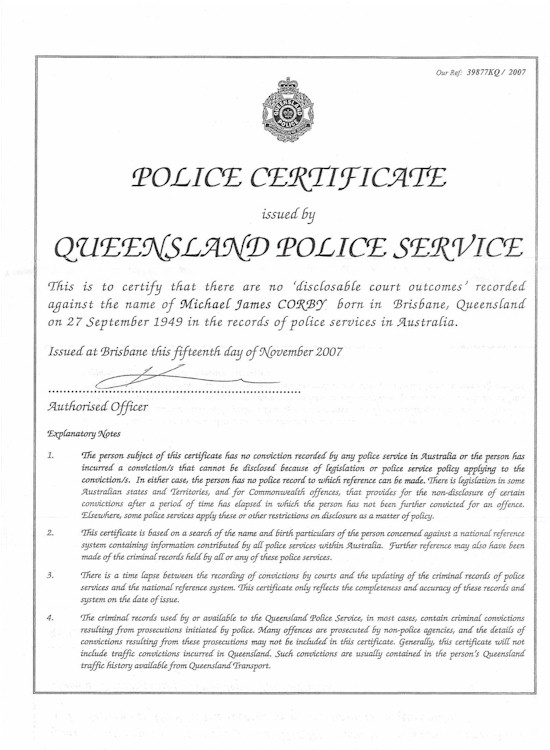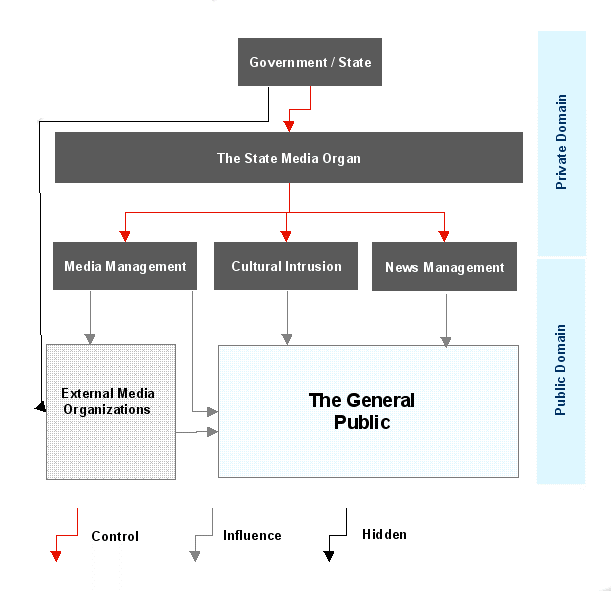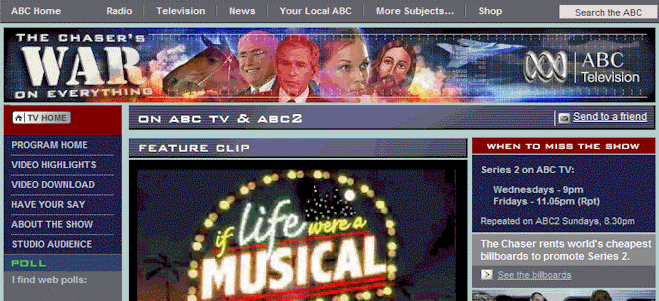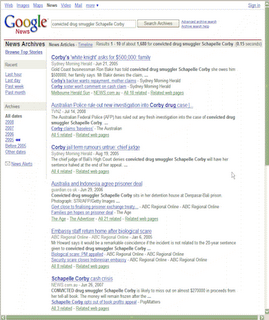
The Schapelle Corby Media Project
An Investigative Journal
Welcome to the Schapelle Corby Media project. The rationale for the project and the objectives of the project are detailed on our introductory page.
The need for such an initiative is evident from even a cursory examination of the media publications and broadcasts over a number of years. Equally, serious criticism of the Australian media is now widespread and international. The YouTube film embedded on the front page for example was produced in the United Kingdom. A similar film has recently been produced in the United States.
Even Civil Liberties Australia (CLA) have commented: "The real story is how a young powerless woman is being imprisoned for a crime that she probably had nothing to do with. But the Australian media have become her persecutor"
Neither is it a question of the odd rogue article or broadcast: it has been systematic. We have seen countless examples of unsubstantiated allegations and in some cases outright lies. We have seen widescale censorship, in the form of hard news stories being completely ignored.
For any ethical journalist this is deeply disturbing. The fact that it has continued for so long reflects upon the profession as a whole.
The project will investigate and examine all aspects of this. It will probe the origins, explore the nature of editorial policy, examine the role and motives of individual scribes, and expose many of the specific smears and abuses.
It will seek and expose truth: truth being a pre-requisite to even begin to address this sorry situation. The project is essentially a service to journalism itself.
Tranche 1:
Fairfax Media Limited, News Corporation, AAP, Seven Network, Nine Network, ABC, Ten Network.
Copyright Journoz.Com 2009. All rights reserved.
JournOz.Com
JournOz.Com

Resources For The
Ethical Journalist
Contribute
Do you have any information with respect to the unethical aspects of the reports made on this case?
Can you help expose unethical practices with respect to Schapelle Corby reporting? If so, please contact us on:

Thank you.
Previous Posts
- THE ABC OF OPINION MANAGEMENT: PART 4
- THE ABC OF OPINION MANAGEMENT: PART 3
- THE ABC OF OPINION MANAGEMENT: PART 2
- THE ABC OF OPINION MANAGEMENT: PART 1
- MEDIA INFLUENCE BY ROTE
- THE GLOBAL PROTEST CENSORSHIP CASE
- HOW TO UNDO THE DAMAGE?
- THE ANATOMY OF A SMEAR
- THE SCHAPELLE CORBY MEDIA PROJECT
Archives
Coming Soon
The Truth Behind 'The Hidden Truth'
The Hand of Government
Media Interests in Indonesia
How Deep The Rabbit Hole Goes
Editorial Exposé
ABC: Media Manipulating Media Watch
Related Links
Schapelle Corby:
Schapelle Corby FAQ Artists For Schapelle SchapelleGate Women4Schapelle YouTube
Media EthicsAJA Code ACMA IJNet Press Council Media Alliance Code
Wednesday, June 17, 2009
THE ABC OF OPINION MANAGEMENT: PART 4
Parts 1 and 2 of this investigative series explored key political drivers, and the framework for the opinion management process as a whole. These were illustrated and evidenced with clear unambiguous supportive examples. Part 3 revealed the mindset of the ABC Board, with apparent desire to preserve the relationship with Indonesia at the expense of Schapelle Corby's welfare.
In Part 4 we will begin to investigate events at a more operational level. For our first foray into our database we will focus on what appears to pass for acceptable journalistic practice and behaviour within the ABC.
1. ABUSIVE AND AGGRESSIVE INTERVIEWINGEthical journalists are well aware of the requirement for respect, objectivity and fairness when interviewing members of the public. Indeed, the AJA Code of Ethics covers this through a number of its clauses, amongst them "Use fair, responsible and honest means to obtain material", "Never exploit a person’s vulnerability or ignorance of media practice" and "Respect private grief and personal privacy".
But consider how the ABC interview members of the public. Consider for example how they interviewed Mercedes Corby, in the context of her struggling to support her sister Schapelle during her terrible ordeal. We recently discovered a recording of one such interview. Here are some extracts:
Play Or Download The MP3
(To Download Right Click, 'Save As')[Note: These are short extracts. Much of the interview
is extremely unpleasant and not suitable for a public website]
Mercedes Corby in fact did very well indeed, given the sort of journalist she was confronted with. The bigger issue though is what this open hostility clearly indicates regarding the ABC's position with respect to Schapelle Corby.Consider those words and listen to the tone in his voice.
Is that the voice of someone adopting a neutral, objective, and truth seeking journalistic perspective? Or is it the voice of someone who has a clearly entrenched hostile position, annoyed that a young woman is standing up for herself and her family?
Is it the voice of true objectivity, or the voice of subjective bias?
Is it the voice of someone you would trust to report neutrally and fairly on this issue?
Indeed. I think the same thing too.
2. UNETHICAL RESEARCH & INVESTIGATIONIf you were pursuing the father of Schapelle Corby instead of investigating the real case issues, how would you research him? Perhaps you would use the internet to search for background information.
Or perhaps, because Mr Corby served in the Navy, you would post a question on a naval message board, stating clearly that you were really working on an historical naval piece, and not on Schapelle Corby at all.
No, you wouldn't really do that. And neither would I.
But I'm afraid it appears that the ABC would:
Words escape me.
3. THE DELIVERY OF A SMEARSo, after months of investigation, and after apparently using every dirty and unethical trick in the book, what did the ABC actually discover? They discovered that Mr Corby once smoked a joint at a party. No, seriously, that is what they established: Schapelle's father once smoked a joint at a party.
But what they actually reported wasn't this at all. What they reported was absolutely appalling. The fruits of their labour were embellished to make a series of false but hugely damaging allegations, and state them as fact.
Subsequently, they were forced to apologise:
For the ABC, that ridiculously lame apology, and a note tucked away on their website, the matter was closed. For Schapelle Corby and her hopes that Australian support would bring her home, it was devastating.
A MEMO TO MR STEWARTAllow me to help you with your story Mr Stewart. This is how an investigative journalist would handle it. He would actually ask the police, officially. Here is what the police had to say, for example, when they were asked if you had contacted them: "I can advise that QPS has not spoken with any journalist from 7:30 Report".
Here is what they have had to say on some similar fiction to your own: "We have found no links, nothing at all...". For the record, they even used the word "laughable" in that particular interview.
But more still: they are clearly sick of people creating smoke to give the public the impression of fire. They have even issued a certificate to make it plain:
That took me five minutes to find. Why didn't you find it, Mr Stewart? Or did you?
THE ABC'S ETHOSThe disturbing methods detailed in this article are apparently endorsed by the ABC, at least with respect to Schapelle Corby related stories. They make every honest and ethical journalist shudder, but the ABC would appear to be perfectly happy with them.
In fact only recently they told us that John Stewart was "a good, honest and ethical journalist". Apparently, he had only "made errors in the way he described certain things".
Ah, got it. That's ok then. Thanks for clearing it up for us!
FOOTNOTE
Michael Corby lost his battle with cancer in March 2008, and Schapelle Corby continues to suffer in her Indonesian prison cell. Much of the Australian public have accepted what the ABC told them as truth, and have had their opinions shaped accordingly.
.Labels: abc, australian broadcasting corporation, john stewart
THE ABC OF OPINION MANAGEMENT: PART 3
THE ABC BOARD: THE POLITICAL DIMENSION
I have received a number of emails recently suggesting that I should investigate the ABC Board. I fully intend to look at this area in due course, but in the meantime I had a quick scratch of the surface.
Readers will recall that part 2 of our investigation cited the astonishing ABC MediaWatch broadcast of 30th May 2005. This was a ferocious and sustained attack on other media organs, whilst defending the Indonesian regime which had so seriously breached Ms Corby's human rights. It appeared to be a very clear and open message to the Australian media regarding the requisite nature of future Schapelle Corby reporting.
Straight out of the blocks was a journalist called Janet Albrechtsen, who two days later, produced a shocking piece in The Australian newspaper laced with open hostility to Schapelle Corby, and defending the Indonesian regime, astonishingly referring to "defensible positions taken by democratic governments to deal with perceived problems". Accusing many Australians of "overdosing on compassion", her position could not have been more stark.
The Australian newspaper is a News Corporation publication. With their significant investments and presence in Indonesia, this is perhaps the sort of disturbing story which might be expected to align with News Corp's general editorial stance on this issue.
But wait, Janet Albrechtsen?
Yes, the same Janet Albrechtsen who had been appointed to the governing board of the ABC by Prime Minister John Howard shortly before Schapelle Corby's imprisonment.
You might wish to read that last sentence again. You did read it correctly.
STRATEGIC RELATIONSHIPS TRUMP HUMAN RIGHTSAmongst the general vitriol, Ms Albrechtsen did produce one noteworthy remark: "it may damage Australia's relationship with Indonesia". That relationship was indeed under severe threat.
This insight into the ABC's thinking, at Board level, is extremely interesting. As referenced in part 1 of our investigation the Australian government values that relationship higher than Schapelle Corby's human rights, with the apparent ABC led media campaign in support of this policy emerging simultaneously.
Ms Albrechtsen's comment demonstrates clear knowledge of the political dimension in play. Having been appointed by the government, this is perhaps not surprising. But dropping a direct reference like that amongst the general hostility to Schapelle Corby certainly is surprising, as it illustrates openly what was going through her mind at the very point in time at which the hostile media campaign actually began to unfold in earnest.
[Note that Janet Albrechtsen is still a member of the ABC Board.]
CLICK HERE FOR PART 4
Labels: abc, abc board, australian broadcasting corporation, Janet Albrechtsen
Thursday, March 26, 2009
THE ABC OF OPINION MANAGEMENT: PART 2
For a more profound understanding of media influence upon public opinion, it is beneficial to examine the generic models and methods employed across the world, both current and past. This area of research identifies a range of scenarios, with scale varying from selective and superficial influence, to unrelenting social psychological propaganda.
Within this, the role of the official state-owned media organ is often pivotal, both in terms of shaping opinion, and indeed orchestrating the process itself. Whilst this is particularly evident with respect to totalitarian regimes (such as those in North Korea, Iran and even the old Soviet Union) it is important to understand that it is in fact inherent to most nations, to some extent. Equally, whilst the degree and scope may vary considerably, examination of the actual processes used identifies remarkable similarities of approach.
The processes themselves embrace a far wider and more complex model than just crude manipulation of news delivery. They include direct intrusion into cultural output, as well as often less than subtle guidance of commercial media outlets.
This broad model is widely recognized, widely used, and extremely successful in framing and directing public opinion. It is actively used in varying degrees across the world, albeit generally with respect to a limited range of focus.AUSTRALIA
In Part 1 of this investigation we discussed the ABC's remarkable alignment with apparent government position following the astonishing government backed statements made by AFP Commissioner Keelty, which sent such damaging signals (for Schapelle Corby) to the Indonesian regime in May 2005. We also provided a recent example of the apparent repression of news which is supportive of Schapelle Corby, to illustrate that these issues remain current to this day.In this part of our investigation we will begin to explore a wider canopy of ABC influence, and by virtue of specific examples, consider how closely it fits the three part model described above.
PART 1: MANAGEMENT OF THE MEDIAWithin regimes such as those referenced above, management of other media outlets tends to be a particularly important aspect of the overall role of the state media organ. Direct behind the scenes communication by government is sometimes backed up by the broadcast and publication of material critical of them, which is intended to keep them in line, and perhaps warn them that the state disapproves of their output, or simply indicate that they are out of sync with perceived national interests.
AUSTRALIA
In Australia, the ABC broadcasts Media Watch. This "investigates" and comments on the material and broadcasts of all media channels and publications. Naturally, it is extremely influential within the media sector itself, and attracts a very media centric audience.
In May 2005 the Australian public witnessed a number of abuses of Schapelle Corby's legal and human rights directly on television. Public opinion was overwhelmingly supportive of her and even public disorder was a possibility.Much of the media reflected this situation, reporting the actual events. Their output was also aligned with public opinion.
This sympathetic and supportive public opinion was widespread, and was putting the Australian government's strategic relationship with Indonesia at risk of considerable, and possible long term, damage. It was potentially creating political instability between the two nations. This is frequently cited as the reason for the astonishing government backed statements we have referenced, which significantly harmed Schapelle Corby's prospects.
THE ABC
On 30th May 2005 (within days of Keelty's statement), the ABC launched a series of extraordinary attacks upon Channel 9 in particular, via Media Watch. In fact, almost the entire show was dedicated to this. Its ferocity and sustained nature was astonishing:Radio wasn't immune from the onslaught either. Media Watch vehemently attacked Radio 2GB for simply pointing out that "the judges she addressed yesterday don't speak English and won't get a translation of her comments until today. What's that say about justice".
- It accused the other media of 'feeding xenophobia' against Indonesia: "The media who fed this undercurrent of xenophobia should hang their heads in shame"
- It accused Channel 9 of having been 'bought', using the painfully obvious old trick of quoting anonymous "insiders": "ACA and 60 Minutes have deliberately steered away from any anti Corby stories They don't want to do anything that will blow their access ...it's embarrassing"
- It defended the Indonesian regime which breached Ms Corby's human rights: "Even Ch 9's prestigious 'Sunday' programme followed the station line, and included this swipe at the Indonesian legal system"
- In an article headed "Responsible or Responsive" it also bizarrely tried to accuse journalists of not being hostile to Schapelle Corby because public opinion supported her, whilst at the same time accusing the media of shaping that public opinion! The irony of this contradictory line is also not lost on us.
The open message to the rest of the Australian media from the ABC, regarding requisite Schapelle Corby reporting, would therefore appear to be rather clear.
PART 2: CULTURAL OUTPUT INTRUSIONThe use of non-news broadcasts to condition and influence a population is an established channel within the overall framework of opinion management. It can be extremely effective, particularly over the medium and longer terms.
This channel is often used to create a common 'understanding' of values, and generic or subliminal acceptance of key messages, which for various reasons, including sensitivity, cannot be stated openly via direct news or documentary output.
It is a hugely complex field, often embracing great subtlety, but it is also widely recognized, and indeed documented, by students of propaganda and related media studies.
An example of a discipline within this channel is the use of humour or comedy. This lends itself particularly well to certain aspects, such as expanding the parameters and boundaries of political correctness or acceptability, and the insidious undermining of targeted individuals often via insinuation.
AUSTRALIA
It is a matter of record that the ABC's non-news broadcasts were awash with less than helpful references to Schapelle Corby and her family at various stages of the tragic story. This is particularly the case with respect to "comedy".This is, in fact, evident even to this very day. Take the following, for example, extracted just five minutes ago from the ABC website:
This is far from subtle, but let's analyze it regardless.Bush and Howard are clearly individuals for whom it is "politically correct" to target humour of the most cutting and perhaps edgy type. They were national leaders, politically hardened, and the subject of countless barbs and jokes worldwide. They effectively signed on for this, with eyes open, when they entered politics.
But Schapelle Corby? A young woman, subjected to a series of legal and human rights abuses, and struggling daily just to survive in barely imaginable conditions?
Why would the ABC place her image there, other than to signal that it is somehow politically correct and socially acceptable to malign her and her family with the same brand of humour as Bush and Howard? Some might even suggest that Bush and Howard are largely discredited (and even depicted as "bad guys") with similar connotations for Schapelle Corby by association.
It is extremely hard to find any sort of justification or rationale for this crude example of image placement which does not involve the play of negative influence on the public at large.
But it is actually the tip of a very large and disturbing iceberg.
PART 3: NEWS MANAGEMENTThe news and documentary channels of state media organs are of course prime vehicles for propaganda and opinion management by regimes throughout the world. The output can range from simple political spin, to sophisticated censorship and message delivery manipulation.
With respect to those individual citizens targeted by states in order to support an underlying political imperative, additional possibilities emerge, which embrace insidious and direct character assassination, false allegation, and relative news positioning.
AUSTRALIA
The ABC's news related output with respect to Schapelle Corby is a matter of record. They have pitched a variety of high profile broadcasts against Schapelle Corby's interests, and those of her family, engaging in some of the most damaging of the false allegations and smears. This has been presented on a systematic basis, over a period of years.To illustrate that this campaign is still current, in the first part of this series we cited a recent example of apparent censorship. But their long term coverage and non-coverage of Schapelle Corby news is actually littered with serious issues and hugely damaging innuendo. Certain employees of the ABC seem to have excelled in this type of grossly unethical activity.
A simple illustrative example of such an ABC smear? Perhaps that of August 2008, when ABC produced a headline report "Corby's dad linked to drug trade", courtesy of its Lateline broadcast. It presented smear after smear, via scurrilous statements such as "Together, the father Michael Corby senior and his daughter Schapelle Corby represent 30 years in the marijuana business" and "his long drug career, Michael Corby senior avoided going to jail".
Clearly, the significant damage which this caused was not just at point and time of the broadcast itself, but was ongoing, as the seeds had been sown. The subsequent tiny apology on their website ("Lateline apologises for a story aired last month with evidence suggesting that Schapelle Corby's father, the Late Michael Corby Senior was involved in the drug trade.") and a 20 second snippet on air doesn't even begin to repair the harm inflicted to Schapelle Corby's welfare, which this and countless others across the media spectrum have contributed to.
I am sure that all ethical journalists will be appalled by this, especially bearing in mind the high profile nature of the original broadcast, and the fact that the ABC will surely have been well aware of the damaging nature of such smears for the very real prospects of Ms Corby. Unsubstantiated innuendo of a similar nature had been made many times previously, and even, incredibly, whilst Schapelle Corby was in legal process with respect to her appeal.Again, these are matters we will cover in greater depth in future articles, but in truth they are readily available for readers to research for themselves.
AND THE THREE PART MODEL?Our own opinion on the degree of alignment and correlation of all this with the three part opinion management model cited at the start of this article is not material: the information produced above largely speaks for itself.
However, the underlying issues discussed should concern everyone: not only ethical journalists. As grave and unacceptable as they are with respect to Schapelle Corby, the implications are actually even wider. If the ABC is as intrinsic to the state apparatus as the above data suggests, then what other issues are they influencing?
CLICK HERE FOR PART 3
Labels: abc, australian broadcasting corporation
Monday, March 9, 2009
THE ABC OF OPINION MANAGEMENT: PART 1
In an ordered world, one might imagine that a state owned broadcasting corporation may uphold a higher level of reporting ethos and journalism with respect to the Schapelle Corby case than some of the other media organizations. Equally, its position within the structural fabric of Australian society might lead one to believe that the corporation would be sensitive to the need to ensure balance and transparency with respect to stories with complex political and social implications.
However, not only is this demonstrably not the case, but due to its consistent and long term adherence to an extremely controversial government position, it is also at risk of being perceived as an organ of state by increasing numbers. This apparent lack of independence clearly has some potential to embarrass both the ABC and the Australian government internationally. It could also fuel increasing distrust from the general public if and when the detailed pattern of events becomes more widely known.
THE STORY
The main chapters of this part of the story began to unfold when AFP Commissioner Keelty, backed up by the 'Minister for Justice and Customs' Ellison, made a number of public utterances which can only have been damaging to the welfare of Schapelle Corby, and simultaneously music to the ears of an Indonesian regime and judicial system which will no doubt have been delighted to interpret them as a "do as you want with her" signal. Signal is a word of choice here, because indications of position do not require formal, contractual or explicit words. Certainly the President of Law Council of Australia received the signal clearly enough, stating that "It is potentially damaging to the Corby defence, as it will no doubt be transmitted to Bali". Schapelle Corby's lawyer also received it, calling it "an absolute disgrace". The same signal will have been received all too clearly by the Indonesians.The question of why those parties were actually making such startling and hugely damaging comments regarding Schapelle Corby, one of their own citizens, is outside the scope of this project. The most commonly suggested reason however is that the government was desperate to protect its strategic relationship with Indonesia, and the Corby case was causing significant issues stemming from public opinion. In terms of international politics there is no doubt at all that the relationship with Indonesia was, and is, far more important to them than Schapelle Corby's interests or human rights.
Of course, words expressed through government, or state agencies, also send signals to those within its own national borders. In this case, signals are received by both the population and the media, and in the case of the latter, by everyone from journalists and editors, to proprietors. Note also that with respect to the ABC and the media, a number of private channels of communication are also available.
The script which followed this crude intervention is visible to all. The very existence of this investigative project is a direct result of what occurred in the subsequent months and years. The ABC was as enthusiastically loyal to the message apparently supplied by government as any other mainstream player. Indeed, the ABC was actually responsible for some of the most damaging of the false allegations and proven smears.
EXPOSING THE SCRIPT
Against this political landscape some of the ABC's and Australia's most popular news and documentary productions were pitching high profile broadcasts against Schapelle Corby's interests, and those of her family. The broadcasts were clearly having a major impact upon public perception of the case.A range of specific examples of these false allegations, proven smears, and patent censorship of positive or supportive Schapelle Corby news will be exposed by our forthcoming series of articles on the ABC, as will details of our research into the activities of particular journalists and employees. Note that similar JournOz initiatives are also underway with respect to the other Australian mainstream media organs involved.
ABC CENSORSHIP: EXAMPLE CASE 1Because it is topical and timely, our first port of call has to be censorship and the most recent example of this to unfold: the global protest in support of Schapelle Corby.
This was in fact an historical event, from a number of perspectives:
1. It was the first ever global protest in support of an Australian in the entire history of the nation
2. The accompanying video had been described as "ground breaking" and "landmark" by European critics
3. It was the first "cyber-driven" protest to end at the United Nations in the history of the world, as far as we have been able to establish
4. And yes, it was actually delivered to the United Nations in New York by indie-pop singer Tara Hack.
Now, even a schoolboy journalist can see the possibilities here for all sorts of compelling stories. There are simply so many winning cards in play from a journalist's point of view: an historical event both in national and international terms, innovative arts and music, politics, internet/technology, people friendly images and photographs, a household name (Schapelle Corby), a well known location, a singer... it just keeps getting better and better.
The story practically writes itself in a multitude of ways, and would clearly stimulate public interest.
Yet the ABC didn't cover it at all, and nor did any other mainstream organ.
Before we look further at the ABC though, we should view the video which was produced prior to the emergence of the United Nations development:
That was made before the UN news broke. When that news actually broke, therefore, JournOz decided to perform an experiment courtesy of the ABC itself. I had received an email from a leading Schapelle Corby advocate stating that there was about to be a significant development and that it would be censored by the media. I therefore decided to intervene myself, and test the ABC directly and specifically.
The PR for the protest, and the story, were sent to every contact I could find within ABC News, including use of forms provided specifically to notify the corporation of scoops and news tips. They were notified within a couple of hours of the UN press release being posted. They had the news when it was red hot, and they were sent it again on subsequent days. To make it even easier for them, they were even sent photographs and video footage of Tara Hack actually at the UN.
CONTEXT
Let's put this into wider context too. Clearly the above is a significant newsworthy story even by instinct. But also take a look at the ABC's major news reports and broadcasts, and as a journalist compare this story with each of those which are actually presented on air or online. It becomes rather obvious very quickly: relatively speaking the Schapelle Corby UN Protest story is far more newsworthy than a great deal of their actual content.But despite having it on a plate, they didn't use it. In fact they didn't even refer to it at all. ABC viewers and website visitors have no idea that any of this ever happened.
Now also cast your mind back to previous Schapelle Corby stories which have been broadcast by the ABC: to the tenuous links to any form of real news, to the allegations made in them, and even to the ABC having to apologize on air for presenting baseless allegations as fact! But here we have an actual and real story of substance, and it is buried: it is not even referenced as a footnote. Not by ABC and not by any of the other mainstream news organizations.
I find it increasingly difficult to disagree with Mr Rumpole, don't you?
CLICK HERE FOR PART 2
Labels: abc, australian broadcasting corporation, censorship
Monday, March 2, 2009
MEDIA INFLUENCE BY ROTE
On our project introduction page we published the six-part opinion management process cited by the 'Burying The Truth, Burying Schapelle Corby' video film:
Within this, the second step of the process is described thus:
["Routinely refer to her as "Convicted drug smuggler, Schapelle Corby"... as though the wholly discredited show trial had some sort of credibility.Scholars of media influence and branding techniques will understand that the impact of this upon the human psyche over a period of time cannot be over-emphasized in a case like this one. It suggests validity where there is little, and it consistently associates Schapelle Corby in a wholly negative sense with drug smuggling.
EFFECT: This connotation invokes powerful negative imagery in the public mind, re-enforced consistently by repetition."]But has this particular step of the overall media process been applied through pro-active choice? Or simply by accident or via poor quality journalism? How widely has the phrase actually been used in mainstream reporting?
RESEARCH & ANALYSIS
When describing Schapelle Corby in a textual context, there are countless terms and phrases that could in fact be employed. For example:
"Imprisoned Australian, Schapelle Corby"
"Wrongly convicted, Schapelle Corby"
"Human rights abuse victim, Schapelle Corby"
"27 year old Schapelle Corby"
Or perhaps plain and simple "Schapelle Corby".The possibilities are endless, and of course span supportive, damaging and neutral terminology.
For a single publication to select the term "Convicted drug smuggler, Schapelle Corby" from all the options available and then repeat it for years, almost by rote, is more than suspicious. For almost the entire mainstream media of Australia to adopt exactly the same phrase is rather more serious.
I recently undertook some research into this aspect using the JournOz archive database. The results were staggering. However, to present this in public via a trusted third party archive database, albeit a much smaller one, I simply used Google News:
- A search on the phrase "Convicted drug smuggler, Schapelle Corby" reveals 357 published returns (1,680 without the quotes).
A search on "Human rights abuse victim, Schapelle Corby" reveals 0 published returns.
A search on "Imprisoned Australian, Schapelle Corby" reveals 2 published returns.
A search on "Wrongly convicted, Schapelle Corby" reveals 0 published returns.
A search on "27 year old Schapelle Corby" reveals 0 published returns (ditto 28, 29, 30 and 31). The search terms themselves are simply illustrative, but the actual search results clearly demonstrate the point. This is also just one of a number of analytical approaches I adopted, all of which indicated exactly the same pattern.THE STATISTICAL IMPLICATIONS
A key aspect here is to look at the wide range of Australian media organs using precisely the same starkly accusing phrase: Melbourne Herald Sun, News.com.au, Sydney Morning Herald, ABC Regional Online, The Australian, Radio Australia, The Age, The West Australian, Livenews.com.au, Cairns Post - this list just goes on and on.Presumably they would all suggest that they all chose to routinely use the exact same phrase ["Convicted drug smuggler, Schapelle Corby"], with its hugely harmful and negative connotations, by a coincidence of monumental proportions.
But the real world doesn't work like that. Statistically, this is no coincidence: it is outside the parameters of mere random chance. And again it surely raises questions regarding the sort of agenda adherence or orchestration suggested by the Global Protest Censorship Case.
It is extremely disturbing.
NEWS: ANOTHER VIDEOThe media video which I have posted above outlines the broad process which has been evident in this case for some years.
That film was produced in the United Kingdom. This week, however, another video has emerged, this time from the United States. This tackles the blatant Sydney Morning Herald smear and many other specific media fuelled myths:
Such is the volume of this type of grossly misleading material, its sustained nature, and its grave implications for a human life, that I rather suspect there will be many more investigative films appearing in the future.
Labels: schapelle corby media project
2011-08-28
The Schapelle Corby Media Project
via journoz.com


